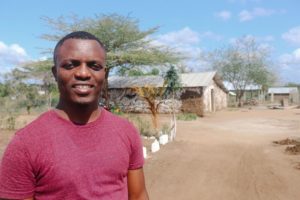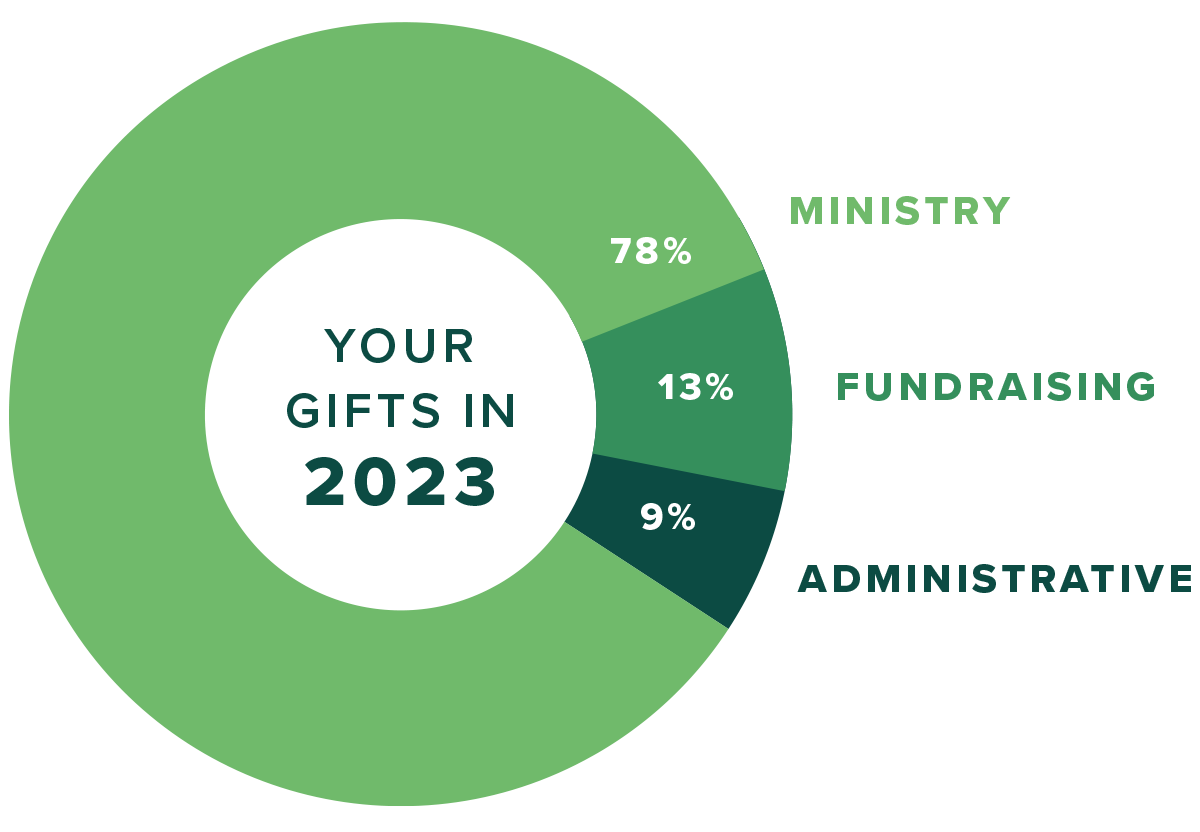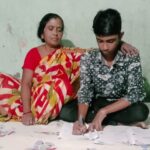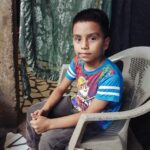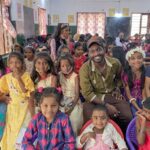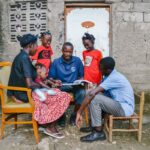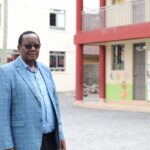A Child Champion draws motivation from his difficult childhood to wholeheartedly serve and love the kids living in poverty in his community – and provide them with hope in a hard place.
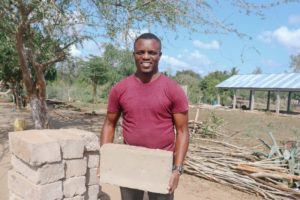
Julius teaches kids at Upendo Hope Center how to make bricks, like this one, with the hope that when they graduate from the program, they will have an extra skill that will help them stand out from the rest of the children in the community and also use it to be financially independent.
Julius Menza, 28, knows what it feels like to grow up in a hard place. Much of his childhood was a struggle. He knows what it feels like to lack basic needs, mentors, and above all, hope. Julius knows what it feels like to have a childhood stolen from him.
This is where Julius, now a Child Champion in Malindi, Kenya, draws his motivation to serve the kids living in poverty in his community.
Julius, the oldest of four, was born in a small, impoverished community in Kilifi, a coastal town in Kenya. His father, Katana, dreamed of having Julius pursue an education, something Katana perceived as a luxury.
Katana, the sole breadwinner for his family, was a peasant farmer and sold home-grown fruits and vegetables to earn a living. He earned the equivalent of $2 on a good day.
However, Kenya’s coastal region gets very little rainfall annually, with less rain in drought years. With a little rain, Katana could successfully farm vegetables, fruits like mangoes and coconuts, and maize for his household and sell the rest to buy basic necessities for his family.
During seasons of drought, however, their farmland would dry up and they would be forced to survive on one meal a day. Child hunger was a daily reality.
As time went by, Julius’ family grew, and he had other siblings. But his father struggled to make enough to feed the growing family.
Despite having a tough time at home, Julius worked hard and excelled in his final-year exam at primary school. Julius was looking forward to high school. His family, too, was delighted and considered it as a miracle because no member of Julius’ immediate or extended family had had a chance to attend school. And those who tried, like his father, didn’t go beyond the primary level.
Trading School for Work
However, their joy was short-lived. In Kenya, public primary school is free but high school requires fees that cover uniforms and stationery. The local school Julius wanted to attend required $100 in annual fees per student. His father didn’t make enough to afford that. So, Julius, then 14, went to work in a quarry so he could help his father pay his school fees.
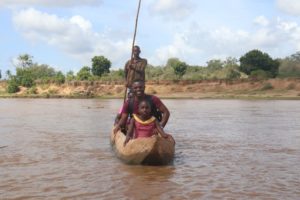
Julius escorts Juliet, a sponsored child, across a river in Malindi to help her and her caregiver buy an animal.
After two months of working, Julius had enough money to buy his high school uniform. He entered high school but had to drop out after two weeks because his family could only pay $20 of the $100 in fees the school demanded. So, Julius instead decided to work to help provide for the family’s basic needs.
“I was forced to look for work to help my father,” he says. “It broke me to see my younger siblings go for days without food. All I wished for was for my siblings and I to get an education and at least a meal a day.”
Oblivious that it was not right for a child to work, Julius traveled 35 miles to Mombasa to look for a job. He was hired by a fisherman to sell fish in Mombasa and Kilifi counties. Julius gradually built up a clientele in Chonyi, a shopping center in Kilifi, 72 miles from Mombasa. He worked extra hard to ensure he sold all his fish so that he would earn a commission and also earn a profit for his employer.
“As most kids woke up in the morning to prepare for school, I woke up at 5 a.m. with the hope that I would sell most, if not all of the fish. I aimed to save for my school fees, too,” he recalls.
Little Motivation to Dream
Julius earned $5 a day selling fish. With the little he earned, he had to buy food for himself, save some for school fees, and send some back home so that his siblings could eat. Julius says that most kids in his poor community never dream of a brighter future because their environment does not motivate them to dream.
“When you grow up in a community where very few people got an education, and for those that succeed, they move out to better places, you will lack someone to look up to,” he says.
In Kenya, when kids are kept out of school, their lives are at risk. Some fall into child labor, others fall into drug and substance abuse, sexual exploitation, and crime. Julius says child labor not only takes away a child’s dignity, but it also takes away their innocence and exposes them to life-threatening situations.
“It exposes kids to people way older than them and most of the time, these people were also previously exposed to child labor, so never care about kids. It is a viciou
Julius serves and mentor kids at the Upendo Hope Center.
s cycle. Most of their conversations are not child-appropriate, and they care the least,” he says.
Due to the nature of his work, he also fell victim to drug abuse. “As a fish vendor, I occasionally went fishing to get extra money,” Julius says. This meant that he had to be a fisherman at night and a fish vendor during the day.
“For me to be awake throughout the night fishing, I was introduced to several drugs that helped keep me awake, because all other fishermen used drugs, too,” he says.
With the cold weather at night, handling fish freezers with bare hands, walking barefoot on at the seashores in the early mornings and late evening, Julius developed frequent colds that led to asthma attacks and bouts of pneumonia.
He earned too little to afford medical treatment, so he often treated the infections with over-the-counter drugs. To date, Julius has not fully recovered from the effects of the harsh working conditions.
Faith That God Would Make a Way
Before dropping out of school, Julius, who was born into a Christian family, loved attending church with his family because his parents wanted to bring him up in the ways of the Lord. However, when he dropped out of school, he stopped going to church. He also started questioning his purpose in life.
“I wondered why God had allowed me to drop out of school. Most of the time, I never prayed, and when I did, I just asked God a lot of questions,” he says.
He recalls asking God, “God why did you let me drop out of school? Why is my family not able to get enough meals? Am I any lesser of a child?” All these questions, Julius says, had answers that were right in front of him all along. Answers he got to know when he decided to follow Christ again and fully trust in Him.
“You are destined for greatness, you are my child, trust me and trust the process.” These are words that 17-year-old Julius heard one evening before retiring to bed after a tedious day of selling fish.
At 18, Julius went back to high school. Despite not having enough funds for the four years in school, he had faith that God would make a way.
“I was happy to rejoin school. Though I at times felt belittled by the young kids who shared a class with me. But I believed in myself, and I knew I wanted to not only live but also thrive in life,” he says.
Along the way, Julius found a good Samaritan who sponsored his education from high school to college. In college, Julius pursued a degree in community development and graduated at the top of his class.
“I chose to pursue community development because I wanted to change my community. I needed to have the skills and knowledge that would help transform the future of my community.”
Children as Agents of Change
After college, Julius says he prayed and asked God to guide him in transforming his community.
“After praying and waiting on God to answer my prayers, He guided me to use my past to transform my community. It is then that I opened my mind to the fact that children play a key role in changing communities,” he says.
“I decided that I will not only guide the kids in my community, but also serve them and hold their hands so that they can thrive. For kids to thrive, they need a mentor, and that is why I am proud to mentor kids in the community.”
When Julius had a chance to serve with OneChild in Malindi, he knew it was an answered prayer.
Today, Julius serves and mentors the kids at Upendo Hope Center. He prays with the kids, teaches them the Word of God, and steps in to counsel the kids and their caregivers whenever they are troubled. He has also introduced skills training at the Hope Center. He teaches kids how to prepare kitchen gardens and farm vegetables, how to make bricks, and tailoring.
“The skills help kill the monotony of the education system that is purely bookwork,” Julius says. “The kids enjoy learning these skills, which will come in handy once they graduate from the program.
“I have been called to serve and minister to the kids,” he says. “The difference is in introducing skills and allowing the kids to explore their potential.”
Reaching More Kids in Poverty
Apart from serving the kids at the Hope Center, Julius is also a child rights activist in his community. He champions for the rights of the kids to basic needs, education, and health care.
In addition to funding his siblings’ education, Julius pays school fees for three other kids in his community. He also helps kids at the Hope Center obtain basic needs like food and helps repair houses for their families.
“I never want to see a child lack basic items in life,” Julius says. “My childhood motivates me to help out whenever I see the need. I never have the money always, but somehow, God provides. I don’t want these kids to miss out on being children and dreaming big beyond poverty.”
To help ensure that his hope for a transformed community is achieved, Julius reached out to his community contacts who are experts in guiding and counseling. They, in turn, helped train youths at the Hope Center to become peer educators who can guide other kids in the community who aren’t registered into OneChild’s program.
“This will ensure they are disciplined, and they are their brothers’ keeper. We Child Champions cannot reach all the kids in the community, but with the few that God has entrusted us with, we ensure that we teach them, and encourage them to spread the good Word out to the rest who are not registered. We are called to spread the gospel, and that is what we do.”
Help children in poverty receive life-changing benefits while they wait for a sponsor. Support Unsponsored Children.
We are accountable to the children we serve AND to our donors.
Our accountability to our donors is one of our highest priorities. Our goal is to use the funds entrusted to us as wise stewards. To do this requires continued monitoring of our fund distribution. OneChild is also a member in good standing with the Evangelical Council for Financial Accountability (ECFA)
